Literature Review of Travel and Tourism Studies
VerifiedAdded on 2020/07/23
|14
|4889
|44
AI Summary
The provided assignment is a detailed literature review of travel and tourism studies. It includes a list of references from 2010 to 2017, covering various research papers and books on topics such as safety and security in tourism, medical tourism, the impact of social media on consumer decision-making, destination competitiveness, and more. The assignment appears to be related to a course or module on travel and tourism studies, likely requiring students to critically analyze and summarize the existing literature on these topics.
Contribute Materials
Your contribution can guide someone’s learning journey. Share your
documents today.
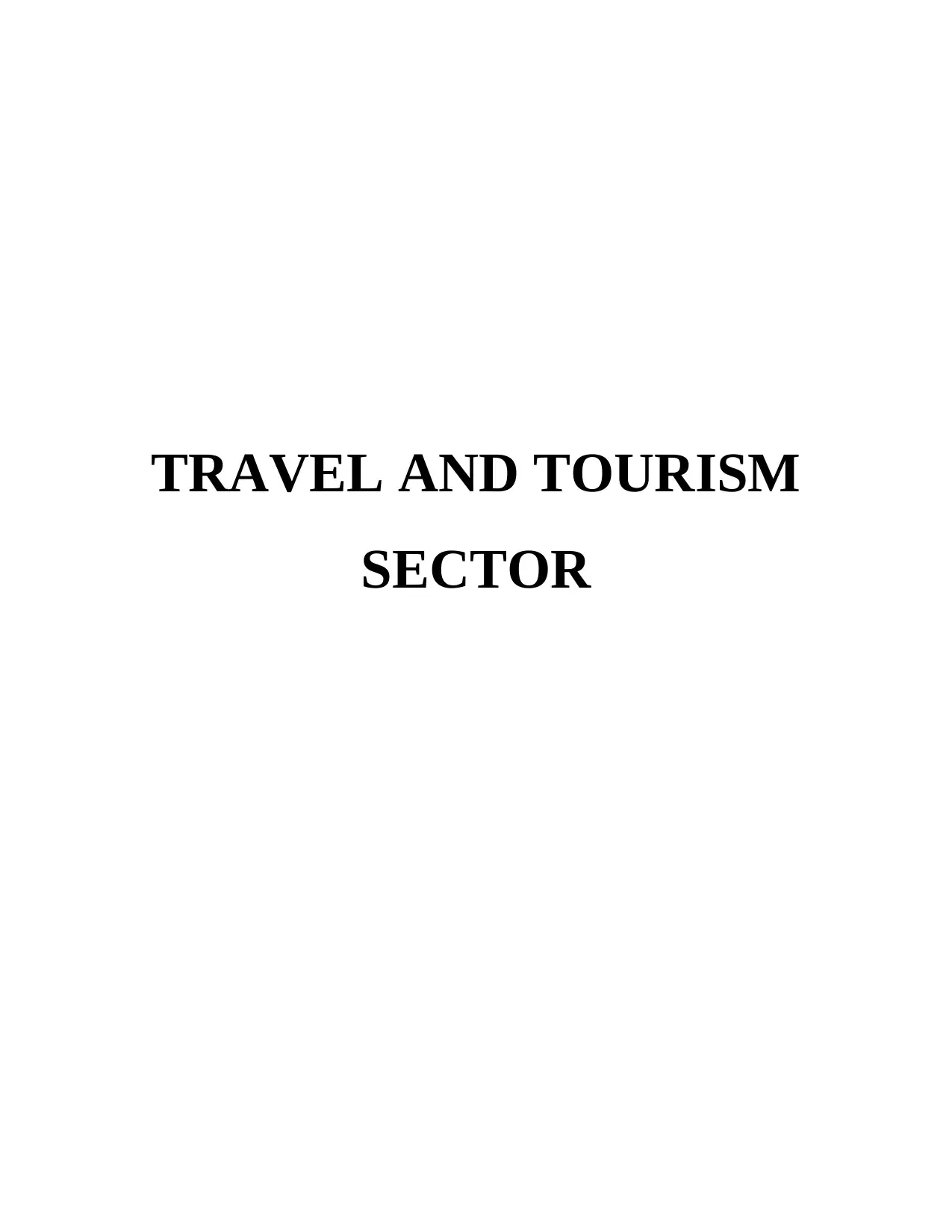
TRAVEL AND TOURISM
SECTOR
SECTOR
Secure Best Marks with AI Grader
Need help grading? Try our AI Grader for instant feedback on your assignments.
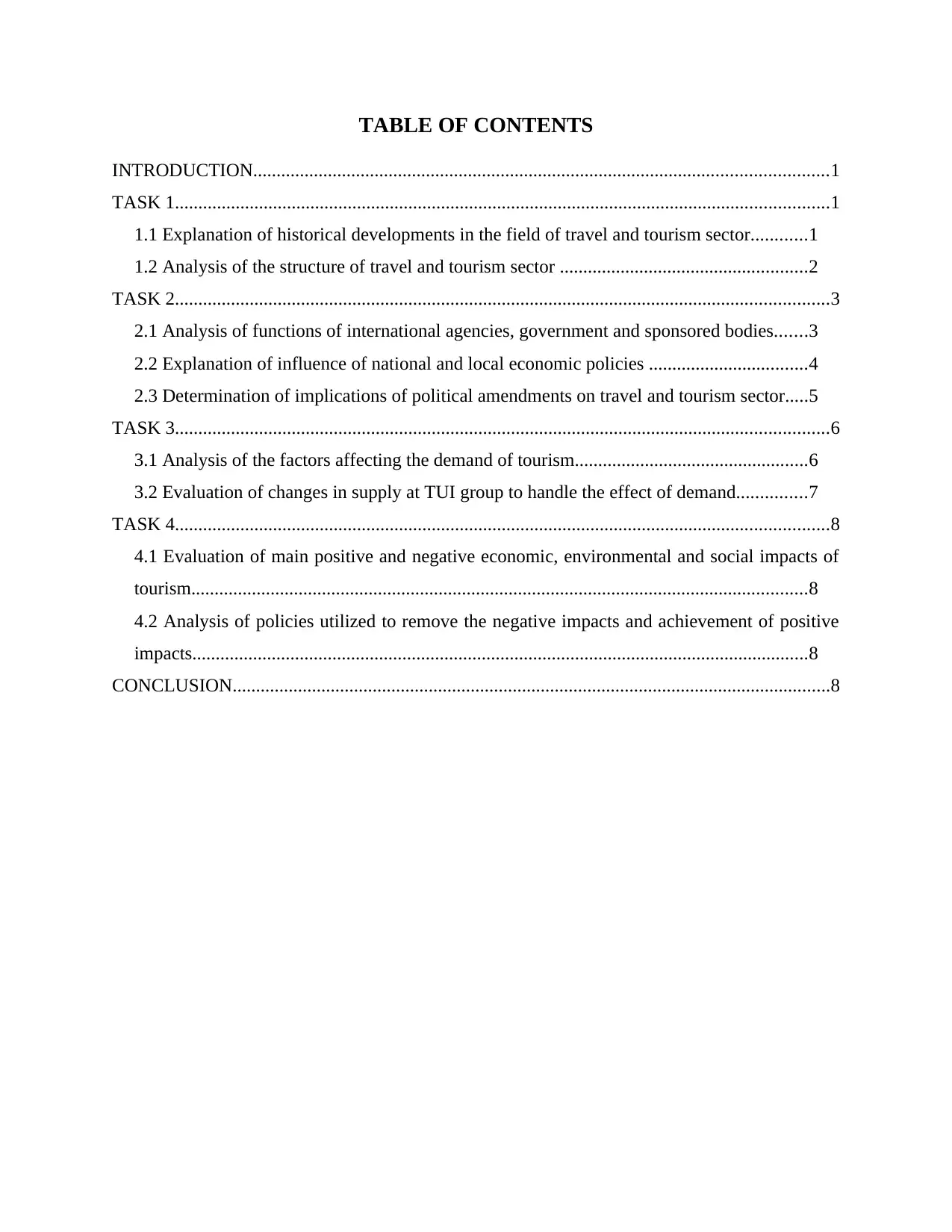
TABLE OF CONTENTS
INTRODUCTION...........................................................................................................................1
TASK 1............................................................................................................................................1
1.1 Explanation of historical developments in the field of travel and tourism sector............1
1.2 Analysis of the structure of travel and tourism sector .....................................................2
TASK 2............................................................................................................................................3
2.1 Analysis of functions of international agencies, government and sponsored bodies.......3
2.2 Explanation of influence of national and local economic policies ..................................4
2.3 Determination of implications of political amendments on travel and tourism sector.....5
TASK 3............................................................................................................................................6
3.1 Analysis of the factors affecting the demand of tourism..................................................6
3.2 Evaluation of changes in supply at TUI group to handle the effect of demand...............7
TASK 4............................................................................................................................................8
4.1 Evaluation of main positive and negative economic, environmental and social impacts of
tourism....................................................................................................................................8
4.2 Analysis of policies utilized to remove the negative impacts and achievement of positive
impacts....................................................................................................................................8
CONCLUSION................................................................................................................................8
INTRODUCTION...........................................................................................................................1
TASK 1............................................................................................................................................1
1.1 Explanation of historical developments in the field of travel and tourism sector............1
1.2 Analysis of the structure of travel and tourism sector .....................................................2
TASK 2............................................................................................................................................3
2.1 Analysis of functions of international agencies, government and sponsored bodies.......3
2.2 Explanation of influence of national and local economic policies ..................................4
2.3 Determination of implications of political amendments on travel and tourism sector.....5
TASK 3............................................................................................................................................6
3.1 Analysis of the factors affecting the demand of tourism..................................................6
3.2 Evaluation of changes in supply at TUI group to handle the effect of demand...............7
TASK 4............................................................................................................................................8
4.1 Evaluation of main positive and negative economic, environmental and social impacts of
tourism....................................................................................................................................8
4.2 Analysis of policies utilized to remove the negative impacts and achievement of positive
impacts....................................................................................................................................8
CONCLUSION................................................................................................................................8
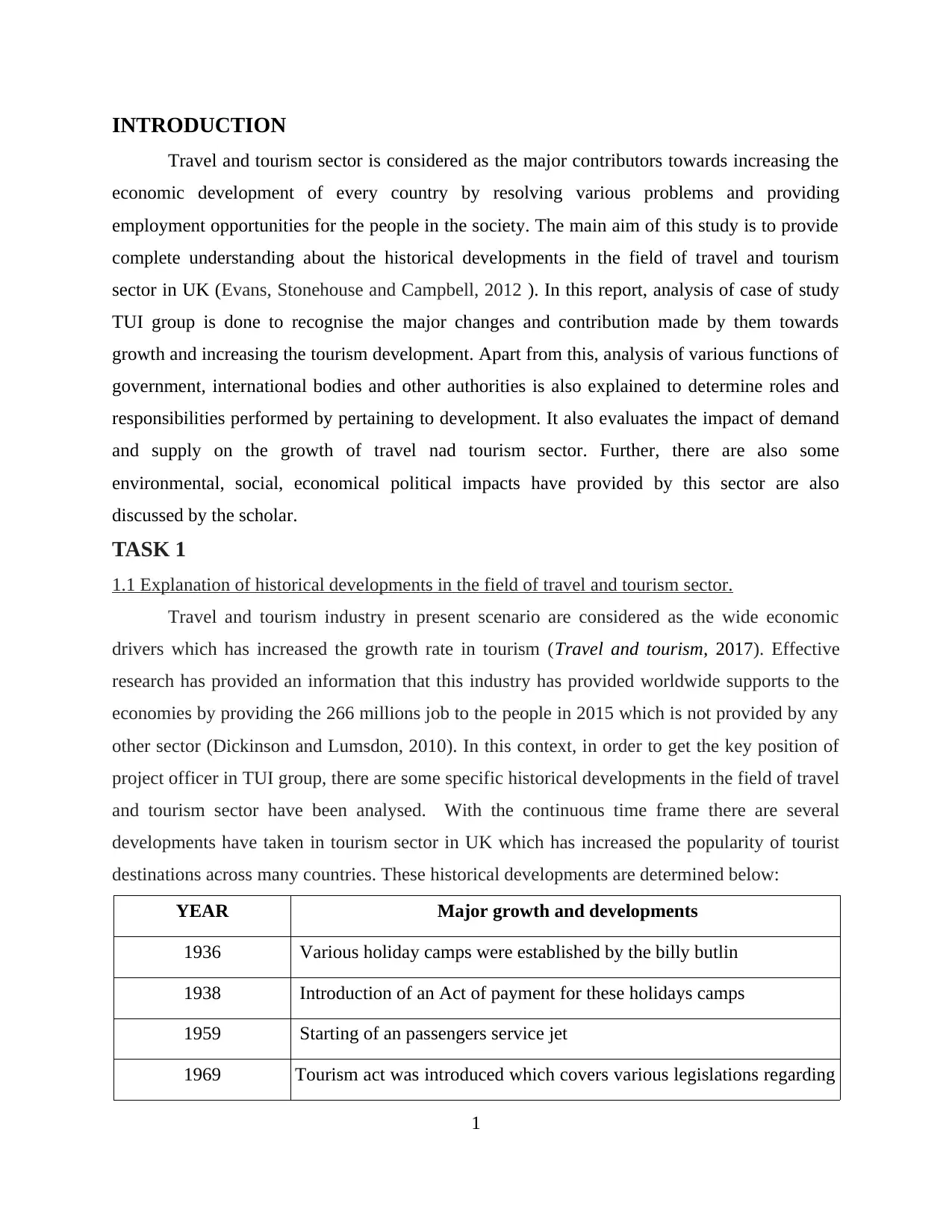
INTRODUCTION
Travel and tourism sector is considered as the major contributors towards increasing the
economic development of every country by resolving various problems and providing
employment opportunities for the people in the society. The main aim of this study is to provide
complete understanding about the historical developments in the field of travel and tourism
sector in UK (Evans, Stonehouse and Campbell, 2012 ). In this report, analysis of case of study
TUI group is done to recognise the major changes and contribution made by them towards
growth and increasing the tourism development. Apart from this, analysis of various functions of
government, international bodies and other authorities is also explained to determine roles and
responsibilities performed by pertaining to development. It also evaluates the impact of demand
and supply on the growth of travel nad tourism sector. Further, there are also some
environmental, social, economical political impacts have provided by this sector are also
discussed by the scholar.
TASK 1
1.1 Explanation of historical developments in the field of travel and tourism sector.
Travel and tourism industry in present scenario are considered as the wide economic
drivers which has increased the growth rate in tourism (Travel and tourism, 2017). Effective
research has provided an information that this industry has provided worldwide supports to the
economies by providing the 266 millions job to the people in 2015 which is not provided by any
other sector (Dickinson and Lumsdon, 2010). In this context, in order to get the key position of
project officer in TUI group, there are some specific historical developments in the field of travel
and tourism sector have been analysed. With the continuous time frame there are several
developments have taken in tourism sector in UK which has increased the popularity of tourist
destinations across many countries. These historical developments are determined below:
YEAR Major growth and developments
1936 Various holiday camps were established by the billy butlin
1938 Introduction of an Act of payment for these holidays camps
1959 Starting of an passengers service jet
1969 Tourism act was introduced which covers various legislations regarding
1
Travel and tourism sector is considered as the major contributors towards increasing the
economic development of every country by resolving various problems and providing
employment opportunities for the people in the society. The main aim of this study is to provide
complete understanding about the historical developments in the field of travel and tourism
sector in UK (Evans, Stonehouse and Campbell, 2012 ). In this report, analysis of case of study
TUI group is done to recognise the major changes and contribution made by them towards
growth and increasing the tourism development. Apart from this, analysis of various functions of
government, international bodies and other authorities is also explained to determine roles and
responsibilities performed by pertaining to development. It also evaluates the impact of demand
and supply on the growth of travel nad tourism sector. Further, there are also some
environmental, social, economical political impacts have provided by this sector are also
discussed by the scholar.
TASK 1
1.1 Explanation of historical developments in the field of travel and tourism sector.
Travel and tourism industry in present scenario are considered as the wide economic
drivers which has increased the growth rate in tourism (Travel and tourism, 2017). Effective
research has provided an information that this industry has provided worldwide supports to the
economies by providing the 266 millions job to the people in 2015 which is not provided by any
other sector (Dickinson and Lumsdon, 2010). In this context, in order to get the key position of
project officer in TUI group, there are some specific historical developments in the field of travel
and tourism sector have been analysed. With the continuous time frame there are several
developments have taken in tourism sector in UK which has increased the popularity of tourist
destinations across many countries. These historical developments are determined below:
YEAR Major growth and developments
1936 Various holiday camps were established by the billy butlin
1938 Introduction of an Act of payment for these holidays camps
1959 Starting of an passengers service jet
1969 Tourism act was introduced which covers various legislations regarding
1
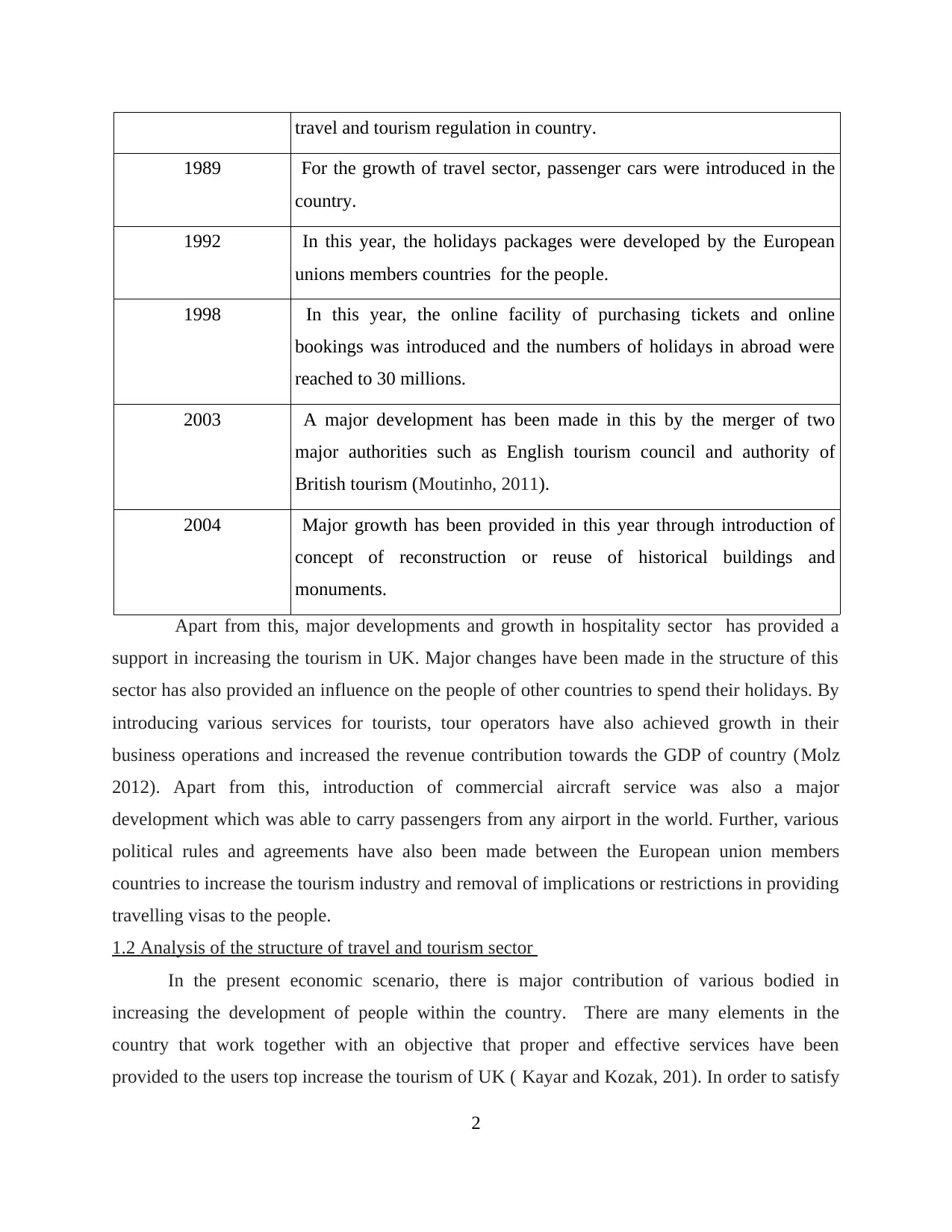
travel and tourism regulation in country.
1989 For the growth of travel sector, passenger cars were introduced in the
country.
1992 In this year, the holidays packages were developed by the European
unions members countries for the people.
1998 In this year, the online facility of purchasing tickets and online
bookings was introduced and the numbers of holidays in abroad were
reached to 30 millions.
2003 A major development has been made in this by the merger of two
major authorities such as English tourism council and authority of
British tourism (Moutinho, 2011).
2004 Major growth has been provided in this year through introduction of
concept of reconstruction or reuse of historical buildings and
monuments.
Apart from this, major developments and growth in hospitality sector has provided a
support in increasing the tourism in UK. Major changes have been made in the structure of this
sector has also provided an influence on the people of other countries to spend their holidays. By
introducing various services for tourists, tour operators have also achieved growth in their
business operations and increased the revenue contribution towards the GDP of country (Molz
2012). Apart from this, introduction of commercial aircraft service was also a major
development which was able to carry passengers from any airport in the world. Further, various
political rules and agreements have also been made between the European union members
countries to increase the tourism industry and removal of implications or restrictions in providing
travelling visas to the people.
1.2 Analysis of the structure of travel and tourism sector
In the present economic scenario, there is major contribution of various bodied in
increasing the development of people within the country. There are many elements in the
country that work together with an objective that proper and effective services have been
provided to the users top increase the tourism of UK ( Kayar and Kozak, 201). In order to satisfy
2
1989 For the growth of travel sector, passenger cars were introduced in the
country.
1992 In this year, the holidays packages were developed by the European
unions members countries for the people.
1998 In this year, the online facility of purchasing tickets and online
bookings was introduced and the numbers of holidays in abroad were
reached to 30 millions.
2003 A major development has been made in this by the merger of two
major authorities such as English tourism council and authority of
British tourism (Moutinho, 2011).
2004 Major growth has been provided in this year through introduction of
concept of reconstruction or reuse of historical buildings and
monuments.
Apart from this, major developments and growth in hospitality sector has provided a
support in increasing the tourism in UK. Major changes have been made in the structure of this
sector has also provided an influence on the people of other countries to spend their holidays. By
introducing various services for tourists, tour operators have also achieved growth in their
business operations and increased the revenue contribution towards the GDP of country (Molz
2012). Apart from this, introduction of commercial aircraft service was also a major
development which was able to carry passengers from any airport in the world. Further, various
political rules and agreements have also been made between the European union members
countries to increase the tourism industry and removal of implications or restrictions in providing
travelling visas to the people.
1.2 Analysis of the structure of travel and tourism sector
In the present economic scenario, there is major contribution of various bodied in
increasing the development of people within the country. There are many elements in the
country that work together with an objective that proper and effective services have been
provided to the users top increase the tourism of UK ( Kayar and Kozak, 201). In order to satisfy
2
Secure Best Marks with AI Grader
Need help grading? Try our AI Grader for instant feedback on your assignments.
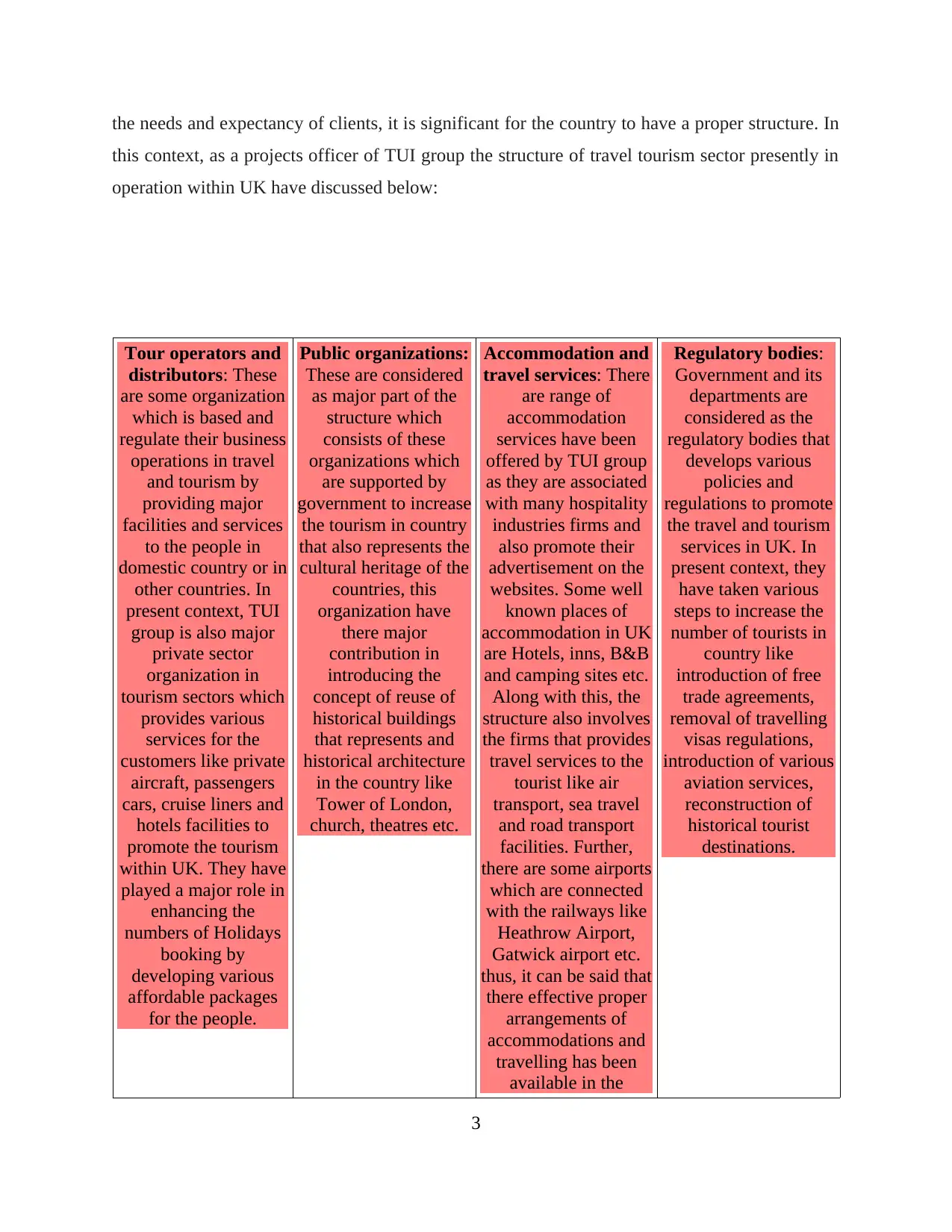
the needs and expectancy of clients, it is significant for the country to have a proper structure. In
this context, as a projects officer of TUI group the structure of travel tourism sector presently in
operation within UK have discussed below:
Tour operators and
distributors: These
are some organization
which is based and
regulate their business
operations in travel
and tourism by
providing major
facilities and services
to the people in
domestic country or in
other countries. In
present context, TUI
group is also major
private sector
organization in
tourism sectors which
provides various
services for the
customers like private
aircraft, passengers
cars, cruise liners and
hotels facilities to
promote the tourism
within UK. They have
played a major role in
enhancing the
numbers of Holidays
booking by
developing various
affordable packages
for the people.
Public organizations:
These are considered
as major part of the
structure which
consists of these
organizations which
are supported by
government to increase
the tourism in country
that also represents the
cultural heritage of the
countries, this
organization have
there major
contribution in
introducing the
concept of reuse of
historical buildings
that represents and
historical architecture
in the country like
Tower of London,
church, theatres etc.
Accommodation and
travel services: There
are range of
accommodation
services have been
offered by TUI group
as they are associated
with many hospitality
industries firms and
also promote their
advertisement on the
websites. Some well
known places of
accommodation in UK
are Hotels, inns, B&B
and camping sites etc.
Along with this, the
structure also involves
the firms that provides
travel services to the
tourist like air
transport, sea travel
and road transport
facilities. Further,
there are some airports
which are connected
with the railways like
Heathrow Airport,
Gatwick airport etc.
thus, it can be said that
there effective proper
arrangements of
accommodations and
travelling has been
available in the
Regulatory bodies:
Government and its
departments are
considered as the
regulatory bodies that
develops various
policies and
regulations to promote
the travel and tourism
services in UK. In
present context, they
have taken various
steps to increase the
number of tourists in
country like
introduction of free
trade agreements,
removal of travelling
visas regulations,
introduction of various
aviation services,
reconstruction of
historical tourist
destinations.
3
this context, as a projects officer of TUI group the structure of travel tourism sector presently in
operation within UK have discussed below:
Tour operators and
distributors: These
are some organization
which is based and
regulate their business
operations in travel
and tourism by
providing major
facilities and services
to the people in
domestic country or in
other countries. In
present context, TUI
group is also major
private sector
organization in
tourism sectors which
provides various
services for the
customers like private
aircraft, passengers
cars, cruise liners and
hotels facilities to
promote the tourism
within UK. They have
played a major role in
enhancing the
numbers of Holidays
booking by
developing various
affordable packages
for the people.
Public organizations:
These are considered
as major part of the
structure which
consists of these
organizations which
are supported by
government to increase
the tourism in country
that also represents the
cultural heritage of the
countries, this
organization have
there major
contribution in
introducing the
concept of reuse of
historical buildings
that represents and
historical architecture
in the country like
Tower of London,
church, theatres etc.
Accommodation and
travel services: There
are range of
accommodation
services have been
offered by TUI group
as they are associated
with many hospitality
industries firms and
also promote their
advertisement on the
websites. Some well
known places of
accommodation in UK
are Hotels, inns, B&B
and camping sites etc.
Along with this, the
structure also involves
the firms that provides
travel services to the
tourist like air
transport, sea travel
and road transport
facilities. Further,
there are some airports
which are connected
with the railways like
Heathrow Airport,
Gatwick airport etc.
thus, it can be said that
there effective proper
arrangements of
accommodations and
travelling has been
available in the
Regulatory bodies:
Government and its
departments are
considered as the
regulatory bodies that
develops various
policies and
regulations to promote
the travel and tourism
services in UK. In
present context, they
have taken various
steps to increase the
number of tourists in
country like
introduction of free
trade agreements,
removal of travelling
visas regulations,
introduction of various
aviation services,
reconstruction of
historical tourist
destinations.
3
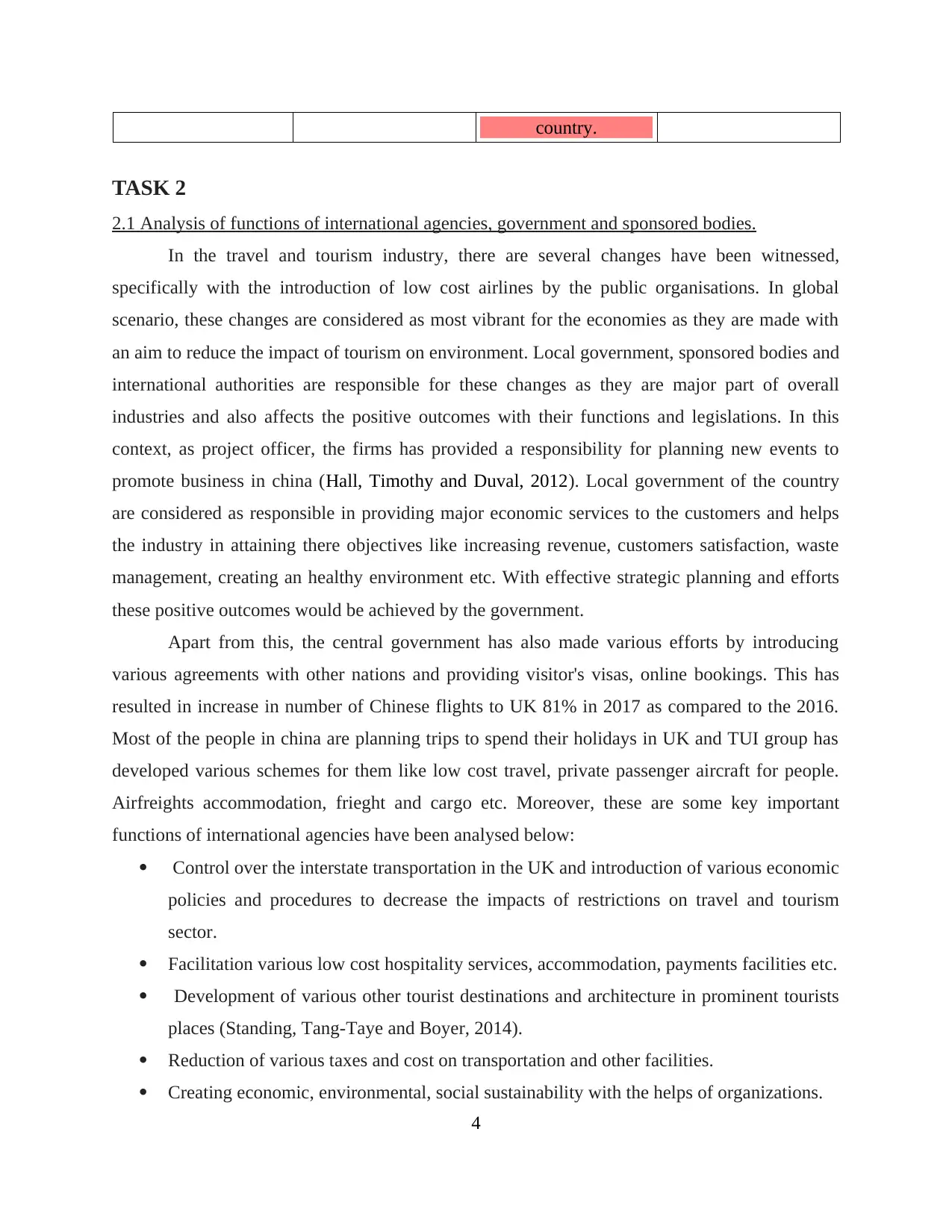
country.
TASK 2
2.1 Analysis of functions of international agencies, government and sponsored bodies.
In the travel and tourism industry, there are several changes have been witnessed,
specifically with the introduction of low cost airlines by the public organisations. In global
scenario, these changes are considered as most vibrant for the economies as they are made with
an aim to reduce the impact of tourism on environment. Local government, sponsored bodies and
international authorities are responsible for these changes as they are major part of overall
industries and also affects the positive outcomes with their functions and legislations. In this
context, as project officer, the firms has provided a responsibility for planning new events to
promote business in china (Hall, Timothy and Duval, 2012). Local government of the country
are considered as responsible in providing major economic services to the customers and helps
the industry in attaining there objectives like increasing revenue, customers satisfaction, waste
management, creating an healthy environment etc. With effective strategic planning and efforts
these positive outcomes would be achieved by the government.
Apart from this, the central government has also made various efforts by introducing
various agreements with other nations and providing visitor's visas, online bookings. This has
resulted in increase in number of Chinese flights to UK 81% in 2017 as compared to the 2016.
Most of the people in china are planning trips to spend their holidays in UK and TUI group has
developed various schemes for them like low cost travel, private passenger aircraft for people.
Airfreights accommodation, frieght and cargo etc. Moreover, these are some key important
functions of international agencies have been analysed below:
Control over the interstate transportation in the UK and introduction of various economic
policies and procedures to decrease the impacts of restrictions on travel and tourism
sector.
Facilitation various low cost hospitality services, accommodation, payments facilities etc.
Development of various other tourist destinations and architecture in prominent tourists
places (Standing, Tang-Taye and Boyer, 2014).
Reduction of various taxes and cost on transportation and other facilities.
Creating economic, environmental, social sustainability with the helps of organizations.
4
TASK 2
2.1 Analysis of functions of international agencies, government and sponsored bodies.
In the travel and tourism industry, there are several changes have been witnessed,
specifically with the introduction of low cost airlines by the public organisations. In global
scenario, these changes are considered as most vibrant for the economies as they are made with
an aim to reduce the impact of tourism on environment. Local government, sponsored bodies and
international authorities are responsible for these changes as they are major part of overall
industries and also affects the positive outcomes with their functions and legislations. In this
context, as project officer, the firms has provided a responsibility for planning new events to
promote business in china (Hall, Timothy and Duval, 2012). Local government of the country
are considered as responsible in providing major economic services to the customers and helps
the industry in attaining there objectives like increasing revenue, customers satisfaction, waste
management, creating an healthy environment etc. With effective strategic planning and efforts
these positive outcomes would be achieved by the government.
Apart from this, the central government has also made various efforts by introducing
various agreements with other nations and providing visitor's visas, online bookings. This has
resulted in increase in number of Chinese flights to UK 81% in 2017 as compared to the 2016.
Most of the people in china are planning trips to spend their holidays in UK and TUI group has
developed various schemes for them like low cost travel, private passenger aircraft for people.
Airfreights accommodation, frieght and cargo etc. Moreover, these are some key important
functions of international agencies have been analysed below:
Control over the interstate transportation in the UK and introduction of various economic
policies and procedures to decrease the impacts of restrictions on travel and tourism
sector.
Facilitation various low cost hospitality services, accommodation, payments facilities etc.
Development of various other tourist destinations and architecture in prominent tourists
places (Standing, Tang-Taye and Boyer, 2014).
Reduction of various taxes and cost on transportation and other facilities.
Creating economic, environmental, social sustainability with the helps of organizations.
4
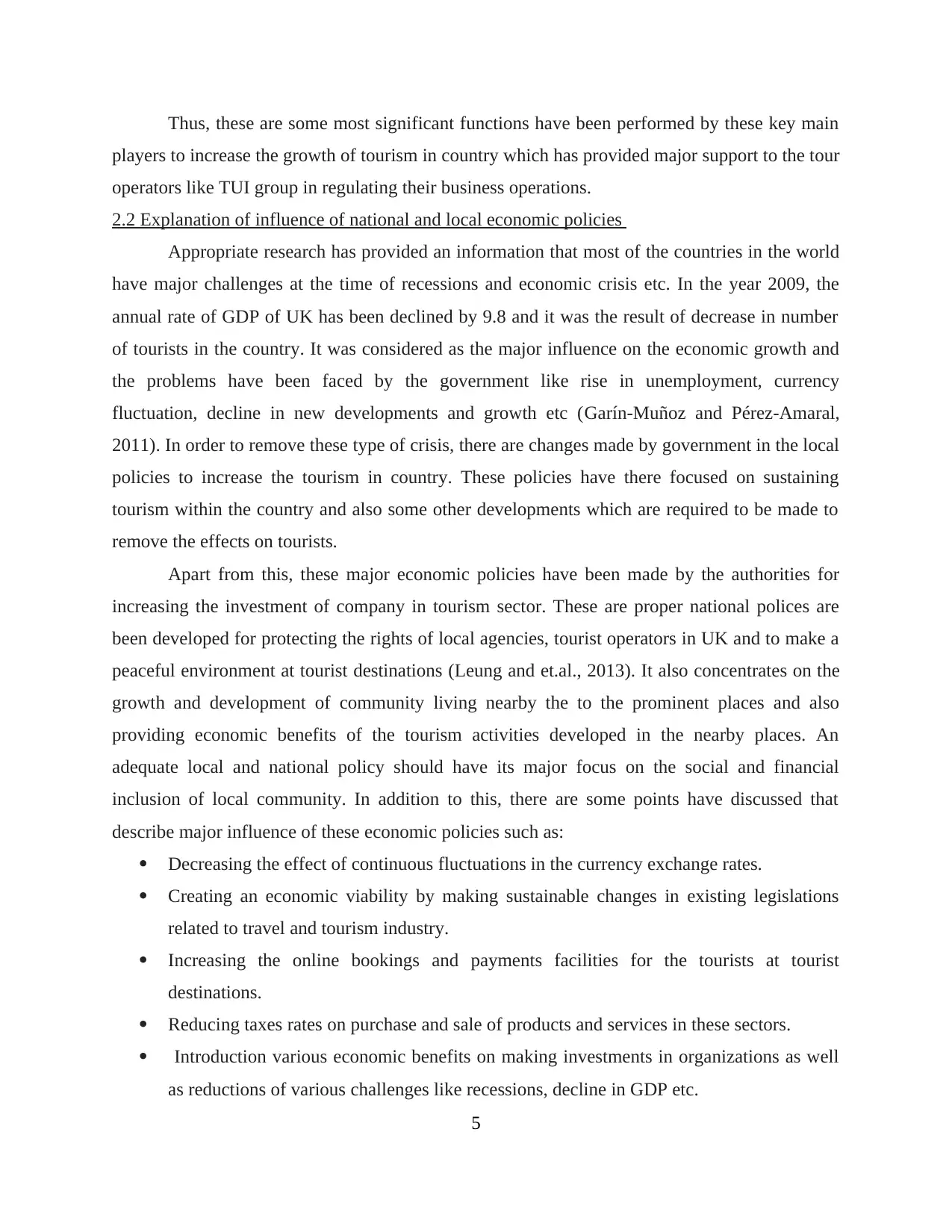
Thus, these are some most significant functions have been performed by these key main
players to increase the growth of tourism in country which has provided major support to the tour
operators like TUI group in regulating their business operations.
2.2 Explanation of influence of national and local economic policies
Appropriate research has provided an information that most of the countries in the world
have major challenges at the time of recessions and economic crisis etc. In the year 2009, the
annual rate of GDP of UK has been declined by 9.8 and it was the result of decrease in number
of tourists in the country. It was considered as the major influence on the economic growth and
the problems have been faced by the government like rise in unemployment, currency
fluctuation, decline in new developments and growth etc (Garín-Muñoz and Pérez-Amaral,
2011). In order to remove these type of crisis, there are changes made by government in the local
policies to increase the tourism in country. These policies have there focused on sustaining
tourism within the country and also some other developments which are required to be made to
remove the effects on tourists.
Apart from this, these major economic policies have been made by the authorities for
increasing the investment of company in tourism sector. These are proper national polices are
been developed for protecting the rights of local agencies, tourist operators in UK and to make a
peaceful environment at tourist destinations (Leung and et.al., 2013). It also concentrates on the
growth and development of community living nearby the to the prominent places and also
providing economic benefits of the tourism activities developed in the nearby places. An
adequate local and national policy should have its major focus on the social and financial
inclusion of local community. In addition to this, there are some points have discussed that
describe major influence of these economic policies such as:
Decreasing the effect of continuous fluctuations in the currency exchange rates.
Creating an economic viability by making sustainable changes in existing legislations
related to travel and tourism industry.
Increasing the online bookings and payments facilities for the tourists at tourist
destinations.
Reducing taxes rates on purchase and sale of products and services in these sectors.
Introduction various economic benefits on making investments in organizations as well
as reductions of various challenges like recessions, decline in GDP etc.
5
players to increase the growth of tourism in country which has provided major support to the tour
operators like TUI group in regulating their business operations.
2.2 Explanation of influence of national and local economic policies
Appropriate research has provided an information that most of the countries in the world
have major challenges at the time of recessions and economic crisis etc. In the year 2009, the
annual rate of GDP of UK has been declined by 9.8 and it was the result of decrease in number
of tourists in the country. It was considered as the major influence on the economic growth and
the problems have been faced by the government like rise in unemployment, currency
fluctuation, decline in new developments and growth etc (Garín-Muñoz and Pérez-Amaral,
2011). In order to remove these type of crisis, there are changes made by government in the local
policies to increase the tourism in country. These policies have there focused on sustaining
tourism within the country and also some other developments which are required to be made to
remove the effects on tourists.
Apart from this, these major economic policies have been made by the authorities for
increasing the investment of company in tourism sector. These are proper national polices are
been developed for protecting the rights of local agencies, tourist operators in UK and to make a
peaceful environment at tourist destinations (Leung and et.al., 2013). It also concentrates on the
growth and development of community living nearby the to the prominent places and also
providing economic benefits of the tourism activities developed in the nearby places. An
adequate local and national policy should have its major focus on the social and financial
inclusion of local community. In addition to this, there are some points have discussed that
describe major influence of these economic policies such as:
Decreasing the effect of continuous fluctuations in the currency exchange rates.
Creating an economic viability by making sustainable changes in existing legislations
related to travel and tourism industry.
Increasing the online bookings and payments facilities for the tourists at tourist
destinations.
Reducing taxes rates on purchase and sale of products and services in these sectors.
Introduction various economic benefits on making investments in organizations as well
as reductions of various challenges like recessions, decline in GDP etc.
5
Paraphrase This Document
Need a fresh take? Get an instant paraphrase of this document with our AI Paraphraser
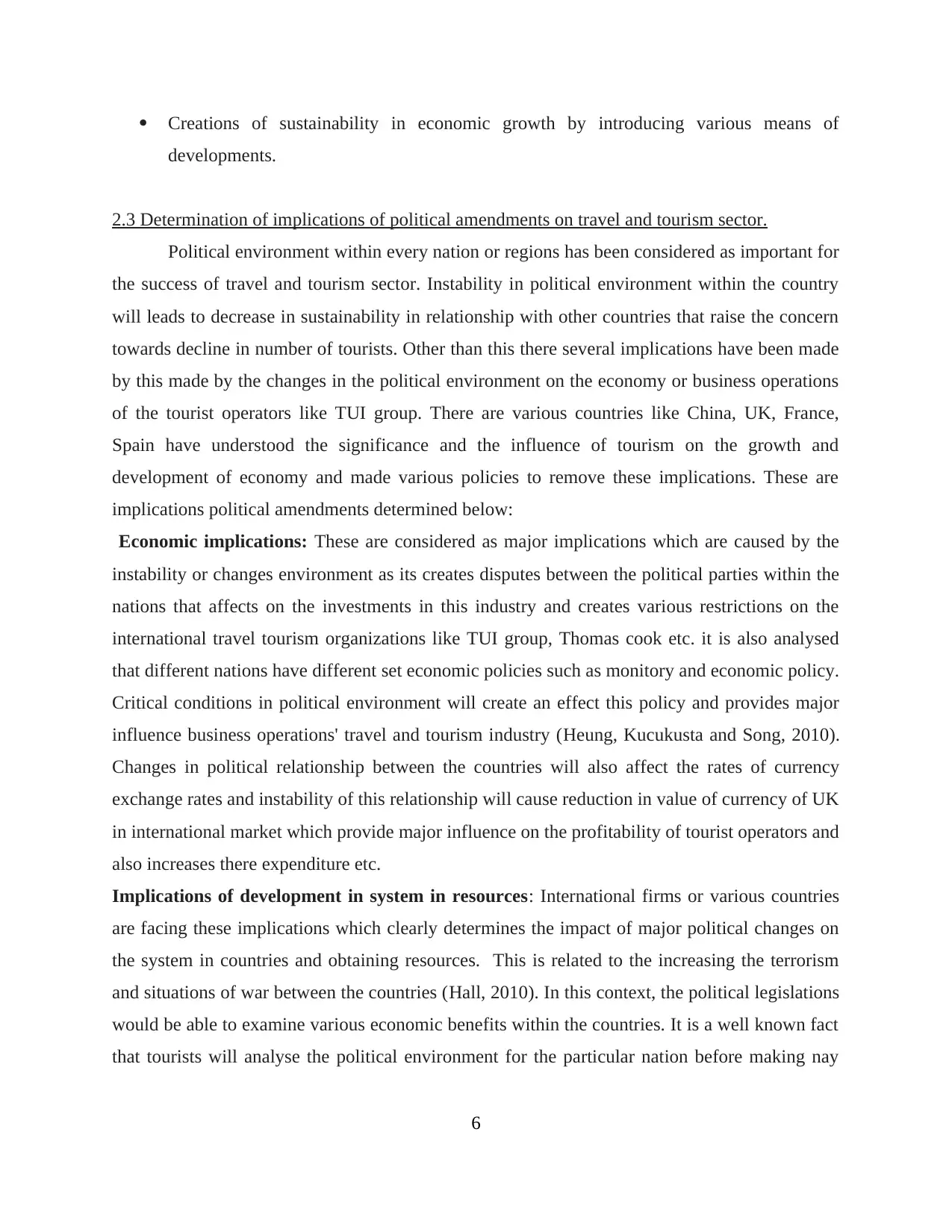
Creations of sustainability in economic growth by introducing various means of
developments.
2.3 Determination of implications of political amendments on travel and tourism sector.
Political environment within every nation or regions has been considered as important for
the success of travel and tourism sector. Instability in political environment within the country
will leads to decrease in sustainability in relationship with other countries that raise the concern
towards decline in number of tourists. Other than this there several implications have been made
by this made by the changes in the political environment on the economy or business operations
of the tourist operators like TUI group. There are various countries like China, UK, France,
Spain have understood the significance and the influence of tourism on the growth and
development of economy and made various policies to remove these implications. These are
implications political amendments determined below:
Economic implications: These are considered as major implications which are caused by the
instability or changes environment as its creates disputes between the political parties within the
nations that affects on the investments in this industry and creates various restrictions on the
international travel tourism organizations like TUI group, Thomas cook etc. it is also analysed
that different nations have different set economic policies such as monitory and economic policy.
Critical conditions in political environment will create an effect this policy and provides major
influence business operations' travel and tourism industry (Heung, Kucukusta and Song, 2010).
Changes in political relationship between the countries will also affect the rates of currency
exchange rates and instability of this relationship will cause reduction in value of currency of UK
in international market which provide major influence on the profitability of tourist operators and
also increases there expenditure etc.
Implications of development in system in resources: International firms or various countries
are facing these implications which clearly determines the impact of major political changes on
the system in countries and obtaining resources. This is related to the increasing the terrorism
and situations of war between the countries (Hall, 2010). In this context, the political legislations
would be able to examine various economic benefits within the countries. It is a well known fact
that tourists will analyse the political environment for the particular nation before making nay
6
developments.
2.3 Determination of implications of political amendments on travel and tourism sector.
Political environment within every nation or regions has been considered as important for
the success of travel and tourism sector. Instability in political environment within the country
will leads to decrease in sustainability in relationship with other countries that raise the concern
towards decline in number of tourists. Other than this there several implications have been made
by this made by the changes in the political environment on the economy or business operations
of the tourist operators like TUI group. There are various countries like China, UK, France,
Spain have understood the significance and the influence of tourism on the growth and
development of economy and made various policies to remove these implications. These are
implications political amendments determined below:
Economic implications: These are considered as major implications which are caused by the
instability or changes environment as its creates disputes between the political parties within the
nations that affects on the investments in this industry and creates various restrictions on the
international travel tourism organizations like TUI group, Thomas cook etc. it is also analysed
that different nations have different set economic policies such as monitory and economic policy.
Critical conditions in political environment will create an effect this policy and provides major
influence business operations' travel and tourism industry (Heung, Kucukusta and Song, 2010).
Changes in political relationship between the countries will also affect the rates of currency
exchange rates and instability of this relationship will cause reduction in value of currency of UK
in international market which provide major influence on the profitability of tourist operators and
also increases there expenditure etc.
Implications of development in system in resources: International firms or various countries
are facing these implications which clearly determines the impact of major political changes on
the system in countries and obtaining resources. This is related to the increasing the terrorism
and situations of war between the countries (Hall, 2010). In this context, the political legislations
would be able to examine various economic benefits within the countries. It is a well known fact
that tourists will analyse the political environment for the particular nation before making nay
6
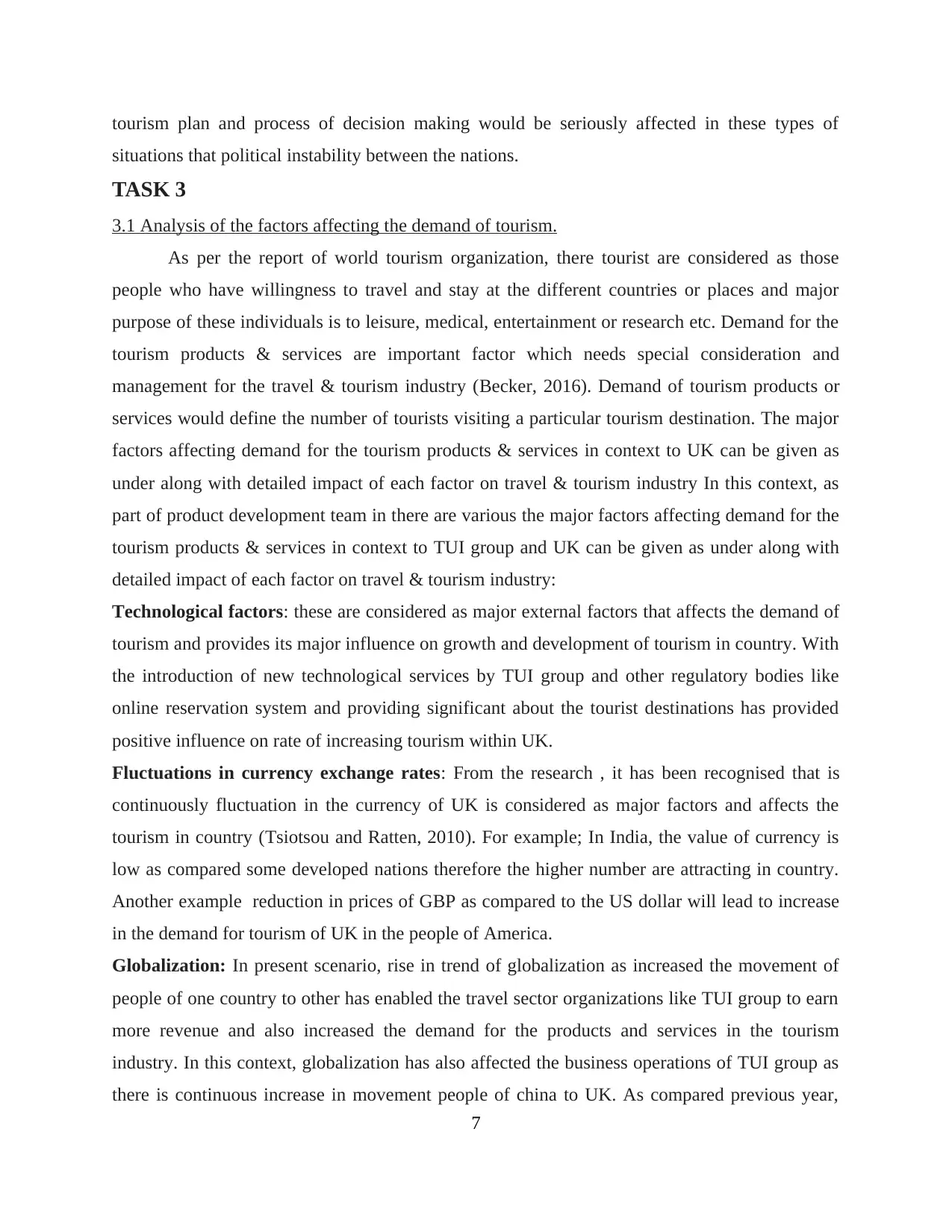
tourism plan and process of decision making would be seriously affected in these types of
situations that political instability between the nations.
TASK 3
3.1 Analysis of the factors affecting the demand of tourism.
As per the report of world tourism organization, there tourist are considered as those
people who have willingness to travel and stay at the different countries or places and major
purpose of these individuals is to leisure, medical, entertainment or research etc. Demand for the
tourism products & services are important factor which needs special consideration and
management for the travel & tourism industry (Becker, 2016). Demand of tourism products or
services would define the number of tourists visiting a particular tourism destination. The major
factors affecting demand for the tourism products & services in context to UK can be given as
under along with detailed impact of each factor on travel & tourism industry In this context, as
part of product development team in there are various the major factors affecting demand for the
tourism products & services in context to TUI group and UK can be given as under along with
detailed impact of each factor on travel & tourism industry:
Technological factors: these are considered as major external factors that affects the demand of
tourism and provides its major influence on growth and development of tourism in country. With
the introduction of new technological services by TUI group and other regulatory bodies like
online reservation system and providing significant about the tourist destinations has provided
positive influence on rate of increasing tourism within UK.
Fluctuations in currency exchange rates: From the research , it has been recognised that is
continuously fluctuation in the currency of UK is considered as major factors and affects the
tourism in country (Tsiotsou and Ratten, 2010). For example; In India, the value of currency is
low as compared some developed nations therefore the higher number are attracting in country.
Another example reduction in prices of GBP as compared to the US dollar will lead to increase
in the demand for tourism of UK in the people of America.
Globalization: In present scenario, rise in trend of globalization as increased the movement of
people of one country to other has enabled the travel sector organizations like TUI group to earn
more revenue and also increased the demand for the products and services in the tourism
industry. In this context, globalization has also affected the business operations of TUI group as
there is continuous increase in movement people of china to UK. As compared previous year,
7
situations that political instability between the nations.
TASK 3
3.1 Analysis of the factors affecting the demand of tourism.
As per the report of world tourism organization, there tourist are considered as those
people who have willingness to travel and stay at the different countries or places and major
purpose of these individuals is to leisure, medical, entertainment or research etc. Demand for the
tourism products & services are important factor which needs special consideration and
management for the travel & tourism industry (Becker, 2016). Demand of tourism products or
services would define the number of tourists visiting a particular tourism destination. The major
factors affecting demand for the tourism products & services in context to UK can be given as
under along with detailed impact of each factor on travel & tourism industry In this context, as
part of product development team in there are various the major factors affecting demand for the
tourism products & services in context to TUI group and UK can be given as under along with
detailed impact of each factor on travel & tourism industry:
Technological factors: these are considered as major external factors that affects the demand of
tourism and provides its major influence on growth and development of tourism in country. With
the introduction of new technological services by TUI group and other regulatory bodies like
online reservation system and providing significant about the tourist destinations has provided
positive influence on rate of increasing tourism within UK.
Fluctuations in currency exchange rates: From the research , it has been recognised that is
continuously fluctuation in the currency of UK is considered as major factors and affects the
tourism in country (Tsiotsou and Ratten, 2010). For example; In India, the value of currency is
low as compared some developed nations therefore the higher number are attracting in country.
Another example reduction in prices of GBP as compared to the US dollar will lead to increase
in the demand for tourism of UK in the people of America.
Globalization: In present scenario, rise in trend of globalization as increased the movement of
people of one country to other has enabled the travel sector organizations like TUI group to earn
more revenue and also increased the demand for the products and services in the tourism
industry. In this context, globalization has also affected the business operations of TUI group as
there is continuous increase in movement people of china to UK. As compared previous year,
7
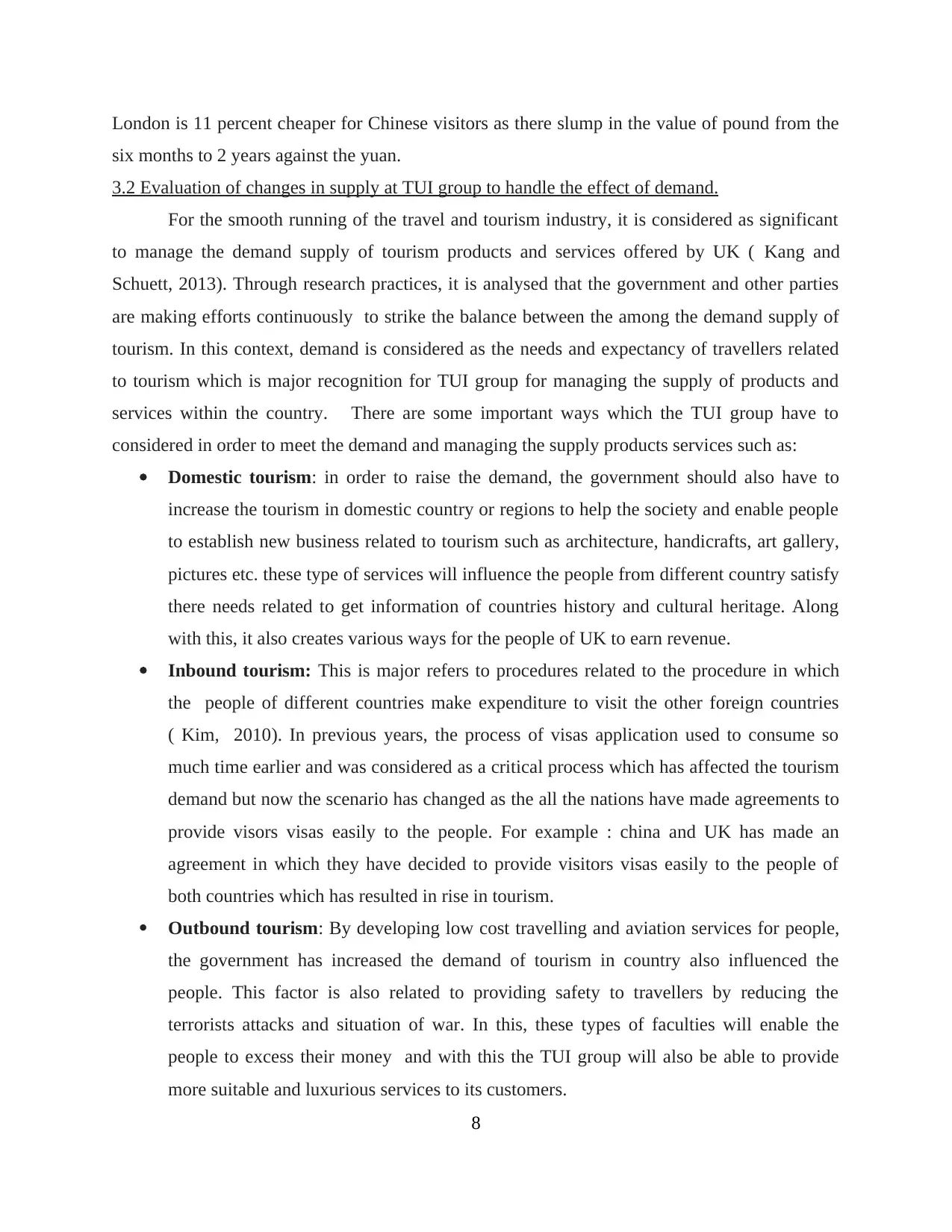
London is 11 percent cheaper for Chinese visitors as there slump in the value of pound from the
six months to 2 years against the yuan.
3.2 Evaluation of changes in supply at TUI group to handle the effect of demand.
For the smooth running of the travel and tourism industry, it is considered as significant
to manage the demand supply of tourism products and services offered by UK ( Kang and
Schuett, 2013). Through research practices, it is analysed that the government and other parties
are making efforts continuously to strike the balance between the among the demand supply of
tourism. In this context, demand is considered as the needs and expectancy of travellers related
to tourism which is major recognition for TUI group for managing the supply of products and
services within the country. There are some important ways which the TUI group have to
considered in order to meet the demand and managing the supply products services such as:
Domestic tourism: in order to raise the demand, the government should also have to
increase the tourism in domestic country or regions to help the society and enable people
to establish new business related to tourism such as architecture, handicrafts, art gallery,
pictures etc. these type of services will influence the people from different country satisfy
there needs related to get information of countries history and cultural heritage. Along
with this, it also creates various ways for the people of UK to earn revenue.
Inbound tourism: This is major refers to procedures related to the procedure in which
the people of different countries make expenditure to visit the other foreign countries
( Kim, 2010). In previous years, the process of visas application used to consume so
much time earlier and was considered as a critical process which has affected the tourism
demand but now the scenario has changed as the all the nations have made agreements to
provide visors visas easily to the people. For example : china and UK has made an
agreement in which they have decided to provide visitors visas easily to the people of
both countries which has resulted in rise in tourism.
Outbound tourism: By developing low cost travelling and aviation services for people,
the government has increased the demand of tourism in country also influenced the
people. This factor is also related to providing safety to travellers by reducing the
terrorists attacks and situation of war. In this, these types of faculties will enable the
people to excess their money and with this the TUI group will also be able to provide
more suitable and luxurious services to its customers.
8
six months to 2 years against the yuan.
3.2 Evaluation of changes in supply at TUI group to handle the effect of demand.
For the smooth running of the travel and tourism industry, it is considered as significant
to manage the demand supply of tourism products and services offered by UK ( Kang and
Schuett, 2013). Through research practices, it is analysed that the government and other parties
are making efforts continuously to strike the balance between the among the demand supply of
tourism. In this context, demand is considered as the needs and expectancy of travellers related
to tourism which is major recognition for TUI group for managing the supply of products and
services within the country. There are some important ways which the TUI group have to
considered in order to meet the demand and managing the supply products services such as:
Domestic tourism: in order to raise the demand, the government should also have to
increase the tourism in domestic country or regions to help the society and enable people
to establish new business related to tourism such as architecture, handicrafts, art gallery,
pictures etc. these type of services will influence the people from different country satisfy
there needs related to get information of countries history and cultural heritage. Along
with this, it also creates various ways for the people of UK to earn revenue.
Inbound tourism: This is major refers to procedures related to the procedure in which
the people of different countries make expenditure to visit the other foreign countries
( Kim, 2010). In previous years, the process of visas application used to consume so
much time earlier and was considered as a critical process which has affected the tourism
demand but now the scenario has changed as the all the nations have made agreements to
provide visors visas easily to the people. For example : china and UK has made an
agreement in which they have decided to provide visitors visas easily to the people of
both countries which has resulted in rise in tourism.
Outbound tourism: By developing low cost travelling and aviation services for people,
the government has increased the demand of tourism in country also influenced the
people. This factor is also related to providing safety to travellers by reducing the
terrorists attacks and situation of war. In this, these types of faculties will enable the
people to excess their money and with this the TUI group will also be able to provide
more suitable and luxurious services to its customers.
8
Secure Best Marks with AI Grader
Need help grading? Try our AI Grader for instant feedback on your assignments.
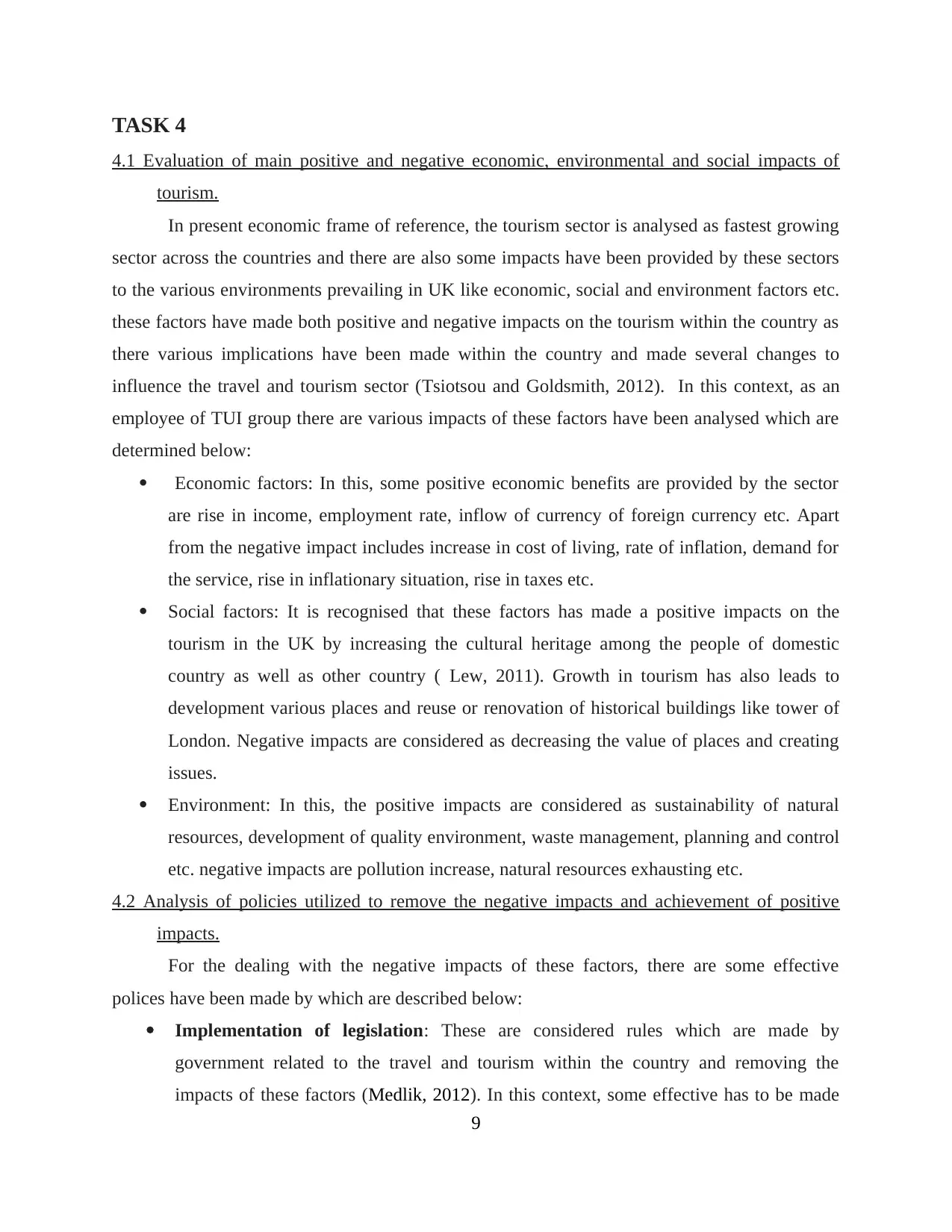
TASK 4
4.1 Evaluation of main positive and negative economic, environmental and social impacts of
tourism.
In present economic frame of reference, the tourism sector is analysed as fastest growing
sector across the countries and there are also some impacts have been provided by these sectors
to the various environments prevailing in UK like economic, social and environment factors etc.
these factors have made both positive and negative impacts on the tourism within the country as
there various implications have been made within the country and made several changes to
influence the travel and tourism sector (Tsiotsou and Goldsmith, 2012). In this context, as an
employee of TUI group there are various impacts of these factors have been analysed which are
determined below:
Economic factors: In this, some positive economic benefits are provided by the sector
are rise in income, employment rate, inflow of currency of foreign currency etc. Apart
from the negative impact includes increase in cost of living, rate of inflation, demand for
the service, rise in inflationary situation, rise in taxes etc.
Social factors: It is recognised that these factors has made a positive impacts on the
tourism in the UK by increasing the cultural heritage among the people of domestic
country as well as other country ( Lew, 2011). Growth in tourism has also leads to
development various places and reuse or renovation of historical buildings like tower of
London. Negative impacts are considered as decreasing the value of places and creating
issues.
Environment: In this, the positive impacts are considered as sustainability of natural
resources, development of quality environment, waste management, planning and control
etc. negative impacts are pollution increase, natural resources exhausting etc.
4.2 Analysis of policies utilized to remove the negative impacts and achievement of positive
impacts.
For the dealing with the negative impacts of these factors, there are some effective
polices have been made by which are described below:
Implementation of legislation: These are considered rules which are made by
government related to the travel and tourism within the country and removing the
impacts of these factors (Medlik, 2012). In this context, some effective has to be made
9
4.1 Evaluation of main positive and negative economic, environmental and social impacts of
tourism.
In present economic frame of reference, the tourism sector is analysed as fastest growing
sector across the countries and there are also some impacts have been provided by these sectors
to the various environments prevailing in UK like economic, social and environment factors etc.
these factors have made both positive and negative impacts on the tourism within the country as
there various implications have been made within the country and made several changes to
influence the travel and tourism sector (Tsiotsou and Goldsmith, 2012). In this context, as an
employee of TUI group there are various impacts of these factors have been analysed which are
determined below:
Economic factors: In this, some positive economic benefits are provided by the sector
are rise in income, employment rate, inflow of currency of foreign currency etc. Apart
from the negative impact includes increase in cost of living, rate of inflation, demand for
the service, rise in inflationary situation, rise in taxes etc.
Social factors: It is recognised that these factors has made a positive impacts on the
tourism in the UK by increasing the cultural heritage among the people of domestic
country as well as other country ( Lew, 2011). Growth in tourism has also leads to
development various places and reuse or renovation of historical buildings like tower of
London. Negative impacts are considered as decreasing the value of places and creating
issues.
Environment: In this, the positive impacts are considered as sustainability of natural
resources, development of quality environment, waste management, planning and control
etc. negative impacts are pollution increase, natural resources exhausting etc.
4.2 Analysis of policies utilized to remove the negative impacts and achievement of positive
impacts.
For the dealing with the negative impacts of these factors, there are some effective
polices have been made by which are described below:
Implementation of legislation: These are considered rules which are made by
government related to the travel and tourism within the country and removing the
impacts of these factors (Medlik, 2012). In this context, some effective has to be made
9
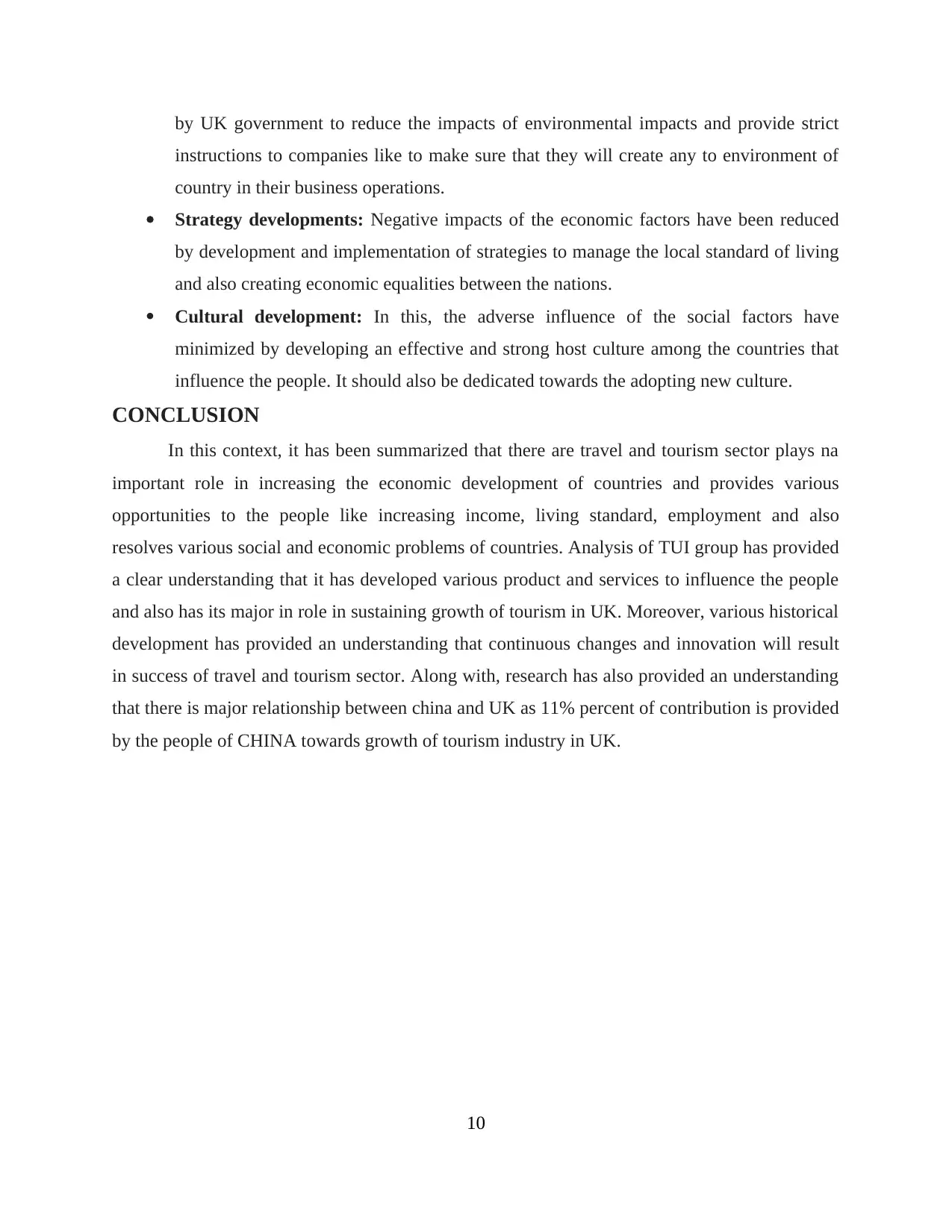
by UK government to reduce the impacts of environmental impacts and provide strict
instructions to companies like to make sure that they will create any to environment of
country in their business operations.
Strategy developments: Negative impacts of the economic factors have been reduced
by development and implementation of strategies to manage the local standard of living
and also creating economic equalities between the nations.
Cultural development: In this, the adverse influence of the social factors have
minimized by developing an effective and strong host culture among the countries that
influence the people. It should also be dedicated towards the adopting new culture.
CONCLUSION
In this context, it has been summarized that there are travel and tourism sector plays na
important role in increasing the economic development of countries and provides various
opportunities to the people like increasing income, living standard, employment and also
resolves various social and economic problems of countries. Analysis of TUI group has provided
a clear understanding that it has developed various product and services to influence the people
and also has its major in role in sustaining growth of tourism in UK. Moreover, various historical
development has provided an understanding that continuous changes and innovation will result
in success of travel and tourism sector. Along with, research has also provided an understanding
that there is major relationship between china and UK as 11% percent of contribution is provided
by the people of CHINA towards growth of tourism industry in UK.
10
instructions to companies like to make sure that they will create any to environment of
country in their business operations.
Strategy developments: Negative impacts of the economic factors have been reduced
by development and implementation of strategies to manage the local standard of living
and also creating economic equalities between the nations.
Cultural development: In this, the adverse influence of the social factors have
minimized by developing an effective and strong host culture among the countries that
influence the people. It should also be dedicated towards the adopting new culture.
CONCLUSION
In this context, it has been summarized that there are travel and tourism sector plays na
important role in increasing the economic development of countries and provides various
opportunities to the people like increasing income, living standard, employment and also
resolves various social and economic problems of countries. Analysis of TUI group has provided
a clear understanding that it has developed various product and services to influence the people
and also has its major in role in sustaining growth of tourism in UK. Moreover, various historical
development has provided an understanding that continuous changes and innovation will result
in success of travel and tourism sector. Along with, research has also provided an understanding
that there is major relationship between china and UK as 11% percent of contribution is provided
by the people of CHINA towards growth of tourism industry in UK.
10
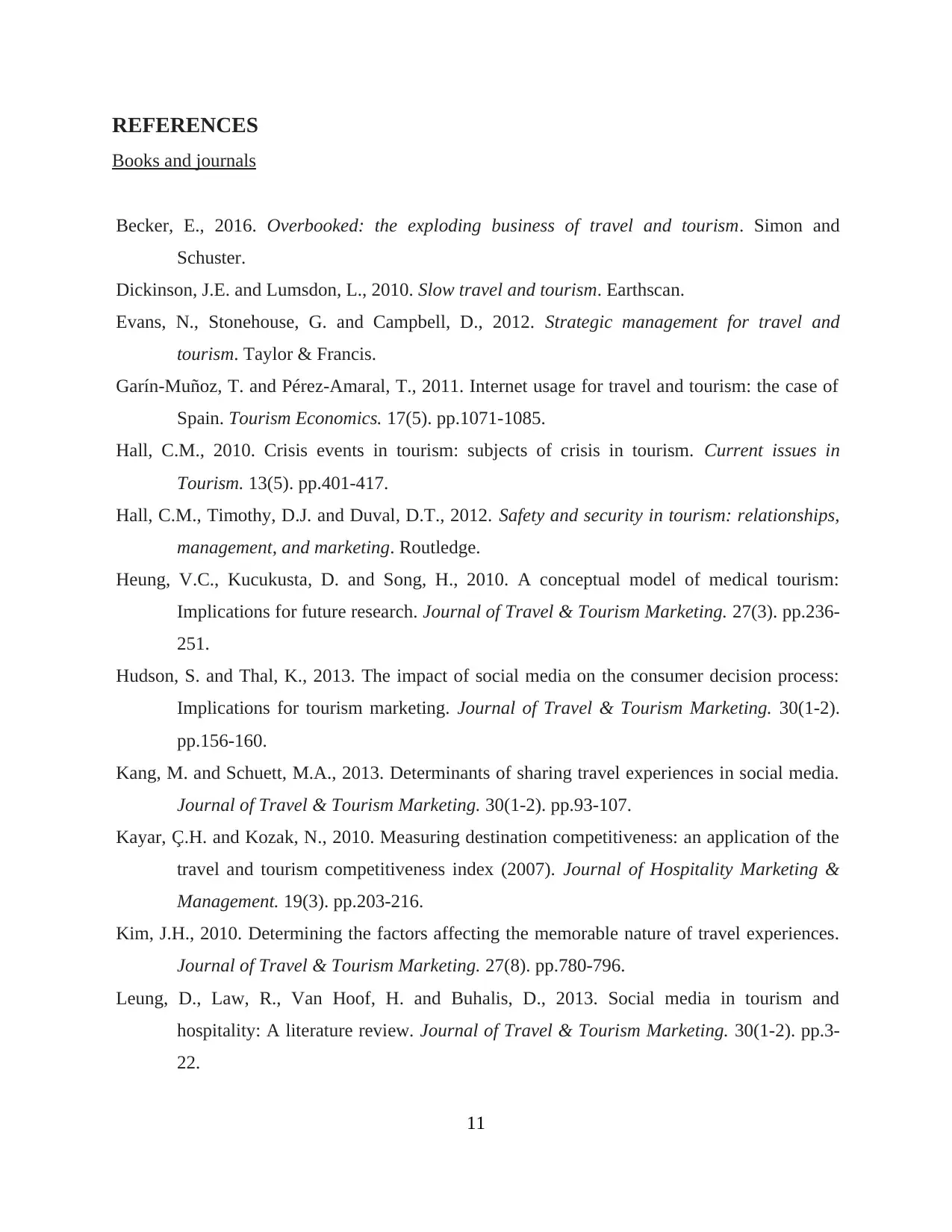
REFERENCES
Books and journals
Becker, E., 2016. Overbooked: the exploding business of travel and tourism. Simon and
Schuster.
Dickinson, J.E. and Lumsdon, L., 2010. Slow travel and tourism. Earthscan.
Evans, N., Stonehouse, G. and Campbell, D., 2012. Strategic management for travel and
tourism. Taylor & Francis.
Garín-Muñoz, T. and Pérez-Amaral, T., 2011. Internet usage for travel and tourism: the case of
Spain. Tourism Economics. 17(5). pp.1071-1085.
Hall, C.M., 2010. Crisis events in tourism: subjects of crisis in tourism. Current issues in
Tourism. 13(5). pp.401-417.
Hall, C.M., Timothy, D.J. and Duval, D.T., 2012. Safety and security in tourism: relationships,
management, and marketing. Routledge.
Heung, V.C., Kucukusta, D. and Song, H., 2010. A conceptual model of medical tourism:
Implications for future research. Journal of Travel & Tourism Marketing. 27(3). pp.236-
251.
Hudson, S. and Thal, K., 2013. The impact of social media on the consumer decision process:
Implications for tourism marketing. Journal of Travel & Tourism Marketing. 30(1-2).
pp.156-160.
Kang, M. and Schuett, M.A., 2013. Determinants of sharing travel experiences in social media.
Journal of Travel & Tourism Marketing. 30(1-2). pp.93-107.
Kayar, Ç.H. and Kozak, N., 2010. Measuring destination competitiveness: an application of the
travel and tourism competitiveness index (2007). Journal of Hospitality Marketing &
Management. 19(3). pp.203-216.
Kim, J.H., 2010. Determining the factors affecting the memorable nature of travel experiences.
Journal of Travel & Tourism Marketing. 27(8). pp.780-796.
Leung, D., Law, R., Van Hoof, H. and Buhalis, D., 2013. Social media in tourism and
hospitality: A literature review. Journal of Travel & Tourism Marketing. 30(1-2). pp.3-
22.
11
Books and journals
Becker, E., 2016. Overbooked: the exploding business of travel and tourism. Simon and
Schuster.
Dickinson, J.E. and Lumsdon, L., 2010. Slow travel and tourism. Earthscan.
Evans, N., Stonehouse, G. and Campbell, D., 2012. Strategic management for travel and
tourism. Taylor & Francis.
Garín-Muñoz, T. and Pérez-Amaral, T., 2011. Internet usage for travel and tourism: the case of
Spain. Tourism Economics. 17(5). pp.1071-1085.
Hall, C.M., 2010. Crisis events in tourism: subjects of crisis in tourism. Current issues in
Tourism. 13(5). pp.401-417.
Hall, C.M., Timothy, D.J. and Duval, D.T., 2012. Safety and security in tourism: relationships,
management, and marketing. Routledge.
Heung, V.C., Kucukusta, D. and Song, H., 2010. A conceptual model of medical tourism:
Implications for future research. Journal of Travel & Tourism Marketing. 27(3). pp.236-
251.
Hudson, S. and Thal, K., 2013. The impact of social media on the consumer decision process:
Implications for tourism marketing. Journal of Travel & Tourism Marketing. 30(1-2).
pp.156-160.
Kang, M. and Schuett, M.A., 2013. Determinants of sharing travel experiences in social media.
Journal of Travel & Tourism Marketing. 30(1-2). pp.93-107.
Kayar, Ç.H. and Kozak, N., 2010. Measuring destination competitiveness: an application of the
travel and tourism competitiveness index (2007). Journal of Hospitality Marketing &
Management. 19(3). pp.203-216.
Kim, J.H., 2010. Determining the factors affecting the memorable nature of travel experiences.
Journal of Travel & Tourism Marketing. 27(8). pp.780-796.
Leung, D., Law, R., Van Hoof, H. and Buhalis, D., 2013. Social media in tourism and
hospitality: A literature review. Journal of Travel & Tourism Marketing. 30(1-2). pp.3-
22.
11
Paraphrase This Document
Need a fresh take? Get an instant paraphrase of this document with our AI Paraphraser
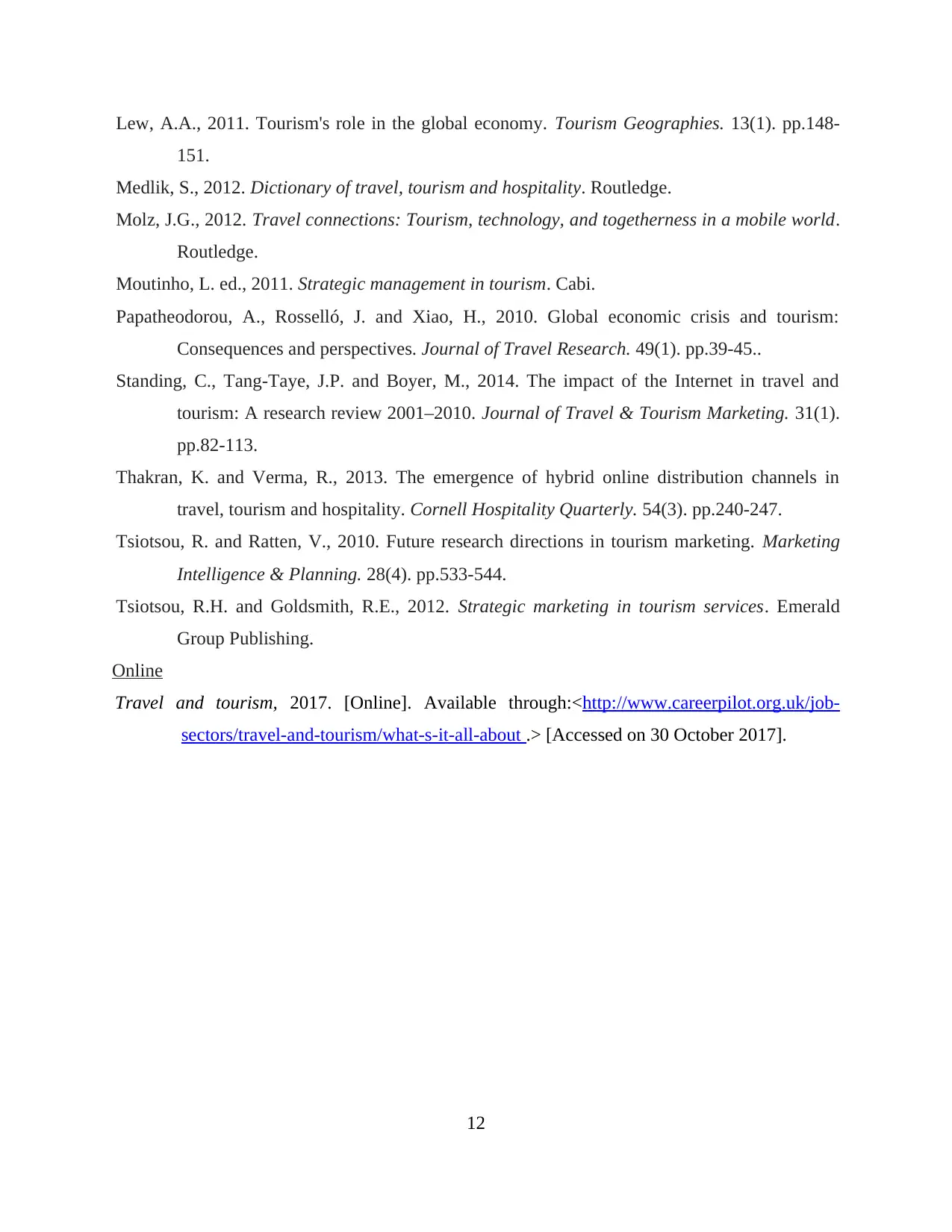
Lew, A.A., 2011. Tourism's role in the global economy. Tourism Geographies. 13(1). pp.148-
151.
Medlik, S., 2012. Dictionary of travel, tourism and hospitality. Routledge.
Molz, J.G., 2012. Travel connections: Tourism, technology, and togetherness in a mobile world.
Routledge.
Moutinho, L. ed., 2011. Strategic management in tourism. Cabi.
Papatheodorou, A., Rosselló, J. and Xiao, H., 2010. Global economic crisis and tourism:
Consequences and perspectives. Journal of Travel Research. 49(1). pp.39-45..
Standing, C., Tang-Taye, J.P. and Boyer, M., 2014. The impact of the Internet in travel and
tourism: A research review 2001–2010. Journal of Travel & Tourism Marketing. 31(1).
pp.82-113.
Thakran, K. and Verma, R., 2013. The emergence of hybrid online distribution channels in
travel, tourism and hospitality. Cornell Hospitality Quarterly. 54(3). pp.240-247.
Tsiotsou, R. and Ratten, V., 2010. Future research directions in tourism marketing. Marketing
Intelligence & Planning. 28(4). pp.533-544.
Tsiotsou, R.H. and Goldsmith, R.E., 2012. Strategic marketing in tourism services. Emerald
Group Publishing.
Online
Travel and tourism, 2017. [Online]. Available through:<http://www.careerpilot.org.uk/job-
sectors/travel-and-tourism/what-s-it-all-about .> [Accessed on 30 October 2017].
12
151.
Medlik, S., 2012. Dictionary of travel, tourism and hospitality. Routledge.
Molz, J.G., 2012. Travel connections: Tourism, technology, and togetherness in a mobile world.
Routledge.
Moutinho, L. ed., 2011. Strategic management in tourism. Cabi.
Papatheodorou, A., Rosselló, J. and Xiao, H., 2010. Global economic crisis and tourism:
Consequences and perspectives. Journal of Travel Research. 49(1). pp.39-45..
Standing, C., Tang-Taye, J.P. and Boyer, M., 2014. The impact of the Internet in travel and
tourism: A research review 2001–2010. Journal of Travel & Tourism Marketing. 31(1).
pp.82-113.
Thakran, K. and Verma, R., 2013. The emergence of hybrid online distribution channels in
travel, tourism and hospitality. Cornell Hospitality Quarterly. 54(3). pp.240-247.
Tsiotsou, R. and Ratten, V., 2010. Future research directions in tourism marketing. Marketing
Intelligence & Planning. 28(4). pp.533-544.
Tsiotsou, R.H. and Goldsmith, R.E., 2012. Strategic marketing in tourism services. Emerald
Group Publishing.
Online
Travel and tourism, 2017. [Online]. Available through:<http://www.careerpilot.org.uk/job-
sectors/travel-and-tourism/what-s-it-all-about .> [Accessed on 30 October 2017].
12
1 out of 14
Related Documents
Your All-in-One AI-Powered Toolkit for Academic Success.
+13062052269
info@desklib.com
Available 24*7 on WhatsApp / Email
![[object Object]](/_next/static/media/star-bottom.7253800d.svg)
Unlock your academic potential
© 2024 | Zucol Services PVT LTD | All rights reserved.





